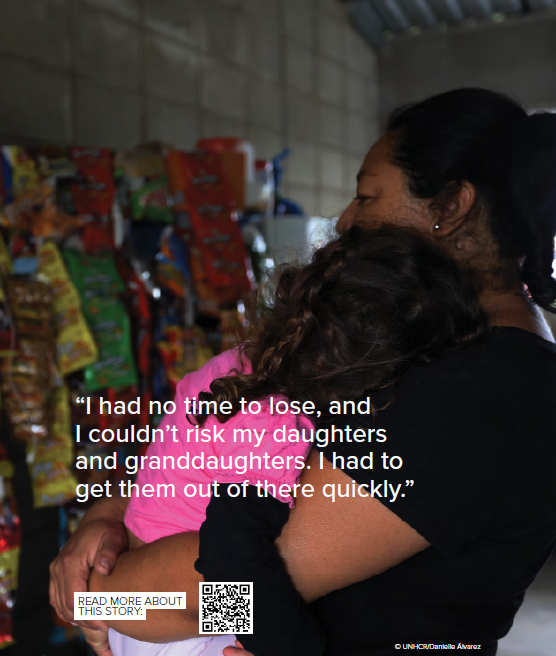
With institutional support, Carla can rebuild her life in Honduras
Carrying only a bag with their family memories, a few toys, and what they were wearing, Carla*, her three daughters, and two granddaughters were forced to leave the village where they were born – in a city in Honduras – after her husband was murdered and they received threats against their lives.
“I received a note on a piece of paper that said that if I didn’t leave the house that same day, all of us would go to accompany my husband,” recalls the mother of the family, who is still in the process of recovering from the loss of her husband and her home. “I had no time to lose, and I couldn’t risk my daughters and granddaughters; I had to get them out of there quickly.”
With the help of the police and a close family member, Carla and her family gathered what they could fit in their hands and got into the police vehicle to leave the only place they knew up to that point. First, they arrived at Carla’s brother’s house in another city in Honduras, but it was clear to her that they would quickly have to find their own place.
Once settled, Carla sought help from the Secretariat of Human Rights (SEDH). “I had heard that there were people who helped when bad things happened to you, but I thought it wasn’t true,” Carla said. “But, a few days after I called, they came to visit me and immediately gave us help, first with vouchers for food and personal cleaning supplies that helped us subsist.”
After two weeks, Carla entered the SEDH entrepreneurship program supported by UNHCR, where she received seed capital that allowed her to start generating income to support her family. “I already had experience with a business selling groceries and beverages. With that, I supported the family economy in my old home,” said Carla excitedly, who has found support in this business that allows her to move forward.
“I started looking for an area where there were no other similar stores, and that’s how I found the house where we live now. We are the only pulpería (grocery store) in this neighborhood; all the neighbors buy tortillas from me early. They no longer have to walk so far to get what they need, so they are also happy with our arrival,” concluded Carla, who, despite the immense difficulties, has found hope and the strength to move forward.
Carla and her daughters are among the more than 247,000 internally displaced people in Honduras. As part of the response, five years ago, Honduras joined the MIRPS and in 2022 led the mechanism as Pro-Tempore Chair. In this role, Honduras extended its response to 13 different institutions, which promote programs for the care of people in need of protection.
*Name changed to protect the identity of the person.

